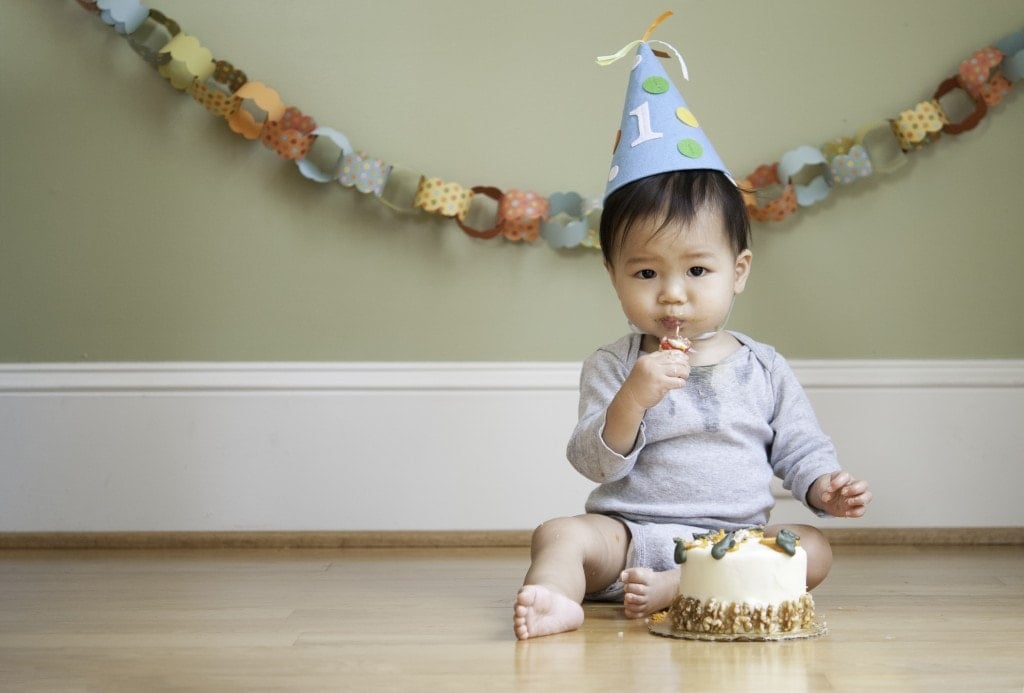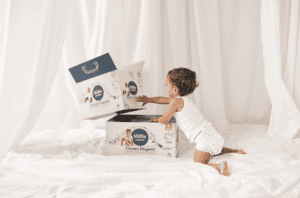Before you have a baby of your own, you may roll your eyes at other parents who squeal in delight over their child rolling over or laugh to yourself when they post a picture of them lifting their head. But when you become a parent yourself, you quickly realize why these little moments are so monumental. After a few weeks at home, you will begin to notice your baby doing little things, and if you’re like me, you start checking off those milestones as your baby’s very first accomplishments.
At each visit to your pediatrician, they may ask a few questions to see if your child is making their milestones at the appropriate time.1 For some parents, these questions can lead to anxiety or stress that their child isn’t keeping up, but don’t fret—babies do things on their own time, and if your child isn’t quite crawling at the average age or babbling when others his age are, it’s totally fine. However, you should discuss any concerns about missed milestones with your doctor. If they aren’t worried, you shouldn’t be either!
While a lift of the head is exciting, it’s around 9-12 months old that things really start to progress. This was when everything changed for my daughter—she became mobile, began to express wants and needs, and before I knew it, my tiny baby had become her own person.
If you want to track your baby’s 9-12 months old milestones on your own, there are many apps available, including one from the CDC (here) that allows you to keep track and add images and videos. Here are the things you need to be keeping an eye out for.
Keeping Track of 9-12 Months Old Milestones
9 MONTH MILESTONES
- Copies sounds and gestures
- Begins to make sounds—”mama” is a popular starting sound!
- Plays peek-a-boo with you
- Begins to use their pincer grasp
- Points at things with fingers
- Pulls themselves up to stand
- Begins to crawl
- Sits up without support
- Understands when you tell them “no”
Emotional Changes:
- Your child may become clingy
- “Stranger danger” often starts around this time
- You may begin to notice your child has preferences for adults, other children, and toys
When to reach out to your doctor:
If you do not see your child doing the following things around this time, it may be best to let your doctor know.
- Doesn’t respond when you call their name
- Cannot sit up without support for a period of time
- Has not said any “words,” such as mama or dada (you are mainly looking for babbles at this point)
- Doesn’t use both hands when playing with toys
- Is not able to put weight on legs with support
- Is missing more than a few milestones above
10 MONTH MILESTONES
- Can repeat a game
- Begins to imitate actions
- Can “play” better with toys, such as pushing items through a container
- Makes silly faces in the mirror
Emotional Changes:
- Jealousy begins to show
- Nightmares may begin
- Babies often need to be kept busy much more around this time
11 MONTH MILESTONES
- Starts to link actions together to reach a goal
- Points to items you name
- Can communicate wants, such as more food, better
- Laughs at silly faces
Emotional Changes:
- May express frustration when told “no”
- Mood swings and tempers become more prevalent
- Simple tasks, such as diaper changes, may become more difficult
12 MONTH MILESTONES
- Looks at images
- Can follow directions, such as putting toys back in a container
- Interacts with toys and objects by shaking them, banging them together, or throwing them
- Attempts to copy words and sounds you say and make
- Can wake and/or shake head
- Pokes & points with the correct index finger
- Hands you items (such as books) when he wants you to read or play with them
- Pulls up to stand
- Cruises (via walking) by holding onto large objects and furniture
- Attempts to take steps
- Begins to stand without assistance
Emotional Changes:
- Suddenly becomes shy when in the presence of new people
- Begins to be afraid of things
- Shows a preference for things and people
- Gets upset when mom or dad leaves the room
When to reach out to your doctor:
If your child is not doing the following by the one-year mark, let your doctor know at their 12-month appointment.
- Does not yet crawl
- Is not able, or has no interest, in standing or cruising
- Doesn’t say words (more than a babble)
- Does not point
- Has missed multiple of the above milestones
It’s the last season before your baby becomes a toddler. These 9-12 months are bittersweet. Enjoy each month and each milestone.






























